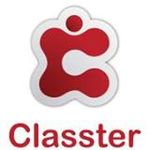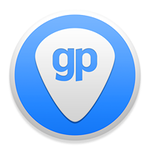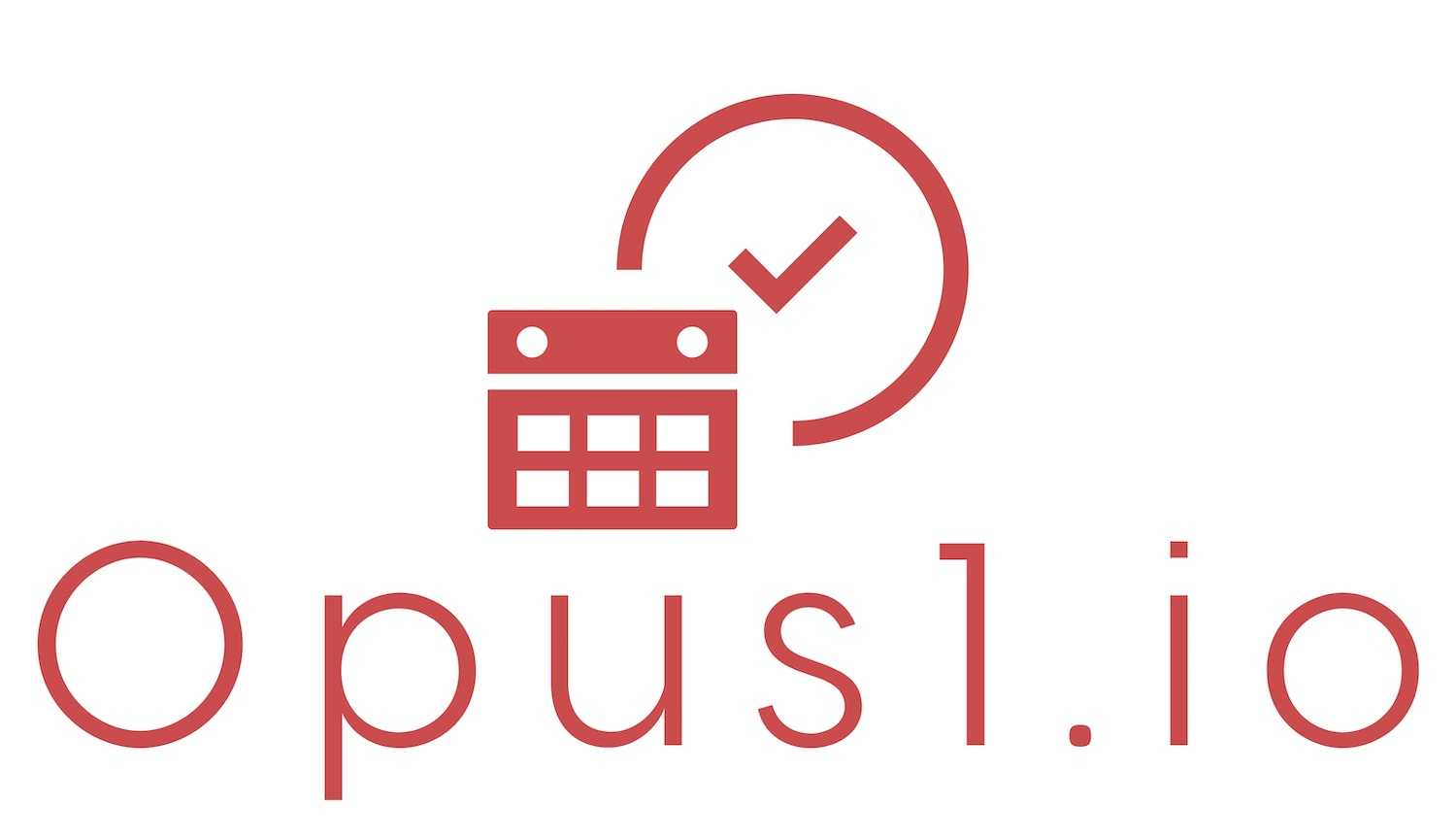Best Music School Software
Best music school software solutions are Teachworks, My Music Staff, Omnify, Pike13, Member Solutions, and ASAP Registration + Management Software. A wide array of features and customization option makes these music school software solutions incredibly popular.



No Cost Personal Advisor
List of 20 Best Music School Software
Emergents | 2024
Simplify & Automate Your Education Business
Teachworks provides business management software to education businesses to automate communication, streamline billing, manage class and lesson scheduling, and maintain & analyze business records. Learn more about Teachworks
Explore various Teachworks features, compare the pricing plans, and unlock the potential of seamless operations by selecting the right software for your business.
Features
View all Teachworks Features- Customizable reporting and analytics
- Online Booking
- Attendance Tracking
- Student Management
- Customizable branding and appearance
- Online payments
- Class Management
- Tutor profile management
Pricing
Starter
$ 16
Per Month
Growth
$ 48
Per Month
Premium
$ 188
Per Month
Teachworks Caters to
- StartUps
- SMBs
- Agencies
- Enterprises
Emergents | 2024
Music School Management Software
Jackrabbit Music is a fully featured Music School Software designed to serve Startups, SMEs. Jackrabbit Music provides end-to-end solutions designed for Web App. This online Music School system offers Repertoire Management, Scheduling, Student Management, Attendance Management, Online Registration at one place. Learn more about Jackrabbit Music
Explore various Jackrabbit Music features, compare the pricing plans, and unlock the potential of seamless operations by selecting the right software for your business.
Features
View all Jackrabbit Music Features- Student Management
- Scheduling
- Online Registration
- Repertoire Management
- Attendance management
- Class Management
Jackrabbit Music Caters to
- StartUps
- SMBs
- Agencies
- Enterprises
Emergents | 2024
Software by Port 443
My Music Staff is a fully featured Music School Software designed to serve SMEs, Startups. My Music Staff provides end-to-end solutions designed for Windows. This online Music School system offers Practice Log, Student Management, Online Registration, Repertoire Management, Class Management at one place. Learn more about My Music Staff
Explore various My Music Staff features, compare the pricing plans, and unlock the potential of seamless operations by selecting the right software for your business.
Features
View all My Music Staff Features- Repertoire Management
- Student Management
- Practice Log
- Online Registration
- Class Management
- Attendance management
- Scheduling
Pricing
My Music Staff
$ 13
month
My Music Staff Caters to
- StartUps
- SMBs
- Agencies
- Enterprises
Reservation Software
Omnify is the complete platform for selling & scheduling your services and engaging with your clients in the most effective way. Our platform helps businesses grow faster through better conversion by providing a ‘Service Store’ instead of just another Booking Page. Read Omnify Reviews
Explore various Omnify features, compare the pricing plans, and unlock the potential of seamless operations by selecting the right software for your business.
Features
View all Omnify Features- Appointment Reminders
- Time & Attendance
- Appointment Management
- Online Waivers
- Confirmation/Reminders
- Capacity Management
- Online Payment
- Mobile Payments
Omnify Caters to
- StartUps
- SMBs
- Agencies
- Enterprises
Emergents | 2024
More Than Scheduling Software
Pike13 software is a cloud-based, mobile-friendly client management software solution that handles the details of check-in and attendance tracking, billing and recurring payments, staff payroll, reporting and more. Branded app and staff app available. Learn more about Pike13
Explore various Pike13 features, compare the pricing plans, and unlock the potential of seamless operations by selecting the right software for your business.
Features
View all Pike13 Features- Alerts/Notifications
- Real-time Scheduling
- Employee scheduling
- Class Scheduling
- Mobile Access
- Client database
- Multi-Location
- Appointment Reminders
Pricing
Business
$ 129
Per Month
Pro
$ 179
Per Month
Pike13 Caters to
- StartUps
- SMBs
- Agencies
- Enterprises
Contenders | 2024
Software by Vanco
ASAP Registration + Management Software is a fully featured School Management Software designed to serve Startups, Agencies. ASAP Registration + Management Software provides end-to-end solutions designed for Windows. This online School Management system offers Transcripts, Food Service Management, Surveys & Feedback, Wait List Management, Group Registration at one place. Read ASAP Reviews
Explore various ASAP features, compare the pricing plans, and unlock the potential of seamless operations by selecting the right software for your business.
Features
View all ASAP Features- Daily Reports
- Discount/Coupon Management
- Parent / Child Records
- Curriculum Management
- Attendance management
- Group Registration
- Parent Portal
- Staff Management
ASAP Caters to
- StartUps
- SMBs
- Agencies
- Enterprises
Emergents | 2024
Software by WellnessLiving Systems Inc
This club and membership management software allows your customers to book a class, event, and the appointments from the Google Maps. Wellnessliving, the gym membership software provides fast and easy-to-use POS systems and improves the productivity of your business. Learn more about WellnessLiving
Explore various WellnessLiving features, compare the pricing plans, and unlock the potential of seamless operations by selecting the right software for your business.
Features
View all WellnessLiving Features- Marketing Management
- Inventory Management
- Employee Management
- Event Management
- Attendance Tracking
- Billing & Invoicing
- Check-In Manager
- Membership Management
Pricing
Starter
$ 39
Per Month
Standard
$ 99
Per Month
WellnessLiving Caters to
- StartUps
- SMBs
- Agencies
- Enterprises
Emergents | 2024
Software by Studio Helper
Music Teacher's Helper is a fully featured Music School Software designed to serve Agencies, Enterprises. Music Teacher's Helper provides end-to-end solutions designed for Windows. This online Music School system offers Class Management, Online Registration, Practice Log, Scheduling, Attendance Management at one place. Learn more about Music Teacher's Helper
Explore various Music Teacher's Helper features, compare the pricing plans, and unlock the potential of seamless operations by selecting the right software for your business.
- Practice Log
- Online Registration
- Attendance management
- Repertoire Management
- Student Management
- Class Management
- Scheduling
Music Teacher's Helper Caters to
- StartUps
- SMBs
- Agencies
- Enterprises
Category Champions | 2024
Simple, Powerful and Professional Scheduling
FREE appointment scheduling software, trusted by 35,000+ independent practitioners, tutors, coaches & small businesses. Setup in less than 2min, and say farewell to admin woes. Works with Android, iPhone/iPad, and Web. Read 10to8 Reviews
Explore various 10to8 features, compare the pricing plans, and unlock the potential of seamless operations by selecting the right software for your business.
Features
View all 10to8 Features- Recurring Appointments
- Procedure Management
- Accounting Integration
- Client Management
- Billing System
- Wait List
- Payroll Management
- Self Service Portal
Pricing
Free
$ 0
Per Month
PRO
$ 7
Seat/Month
PREMIUM
$ 19
Seat/Month
10to8 Caters to
- StartUps
- SMBs
- Agencies
- Enterprises
Emergents | 2024
Software by Vertitech
Classter is a fully featured School Management Software designed to serve Startups, Agencies. Classter provides end-to-end solutions designed for Windows. This online School Management system offers Parent/Student Portal, Online payments, Online Calendar, Financial Management, Curriculum Management at one place. Learn more about Classter
Explore various Classter features, compare the pricing plans, and unlock the potential of seamless operations by selecting the right software for your business.
Features
View all Classter Features- Online Calendar
- Higher Education
- K-12
- Reporting/Analytics
- Special Education
- School District
- Online payments
- Facility Management
Classter Caters to
- StartUps
- SMBs
- Agencies
- Enterprises
Emergents | 2024
Software by ASIMUT software
ASIMUT is a fully featured School Management Software designed to serve Startups, Agencies. ASIMUT provides end-to-end solutions designed for Web App. This online School Management system offers Higher Education, Online Calendar at one place. Learn more about ASIMUT
Explore various ASIMUT features, compare the pricing plans, and unlock the potential of seamless operations by selecting the right software for your business.
Features
View all ASIMUT Features- Higher Education
- Online Calendar
ASIMUT Caters to
- StartUps
- SMBs
- Agencies
- Enterprises
Emergents | 2024
Software by Noteflight
Noteflight is a fully featured Music School Software designed to serve SMEs, Agencies. Noteflight provides end-to-end solutions designed for Web App. This online Music School system offers Class Management, Repertoire Management at one place. Learn more about Noteflight
Explore various Noteflight features, compare the pricing plans, and unlock the potential of seamless operations by selecting the right software for your business.
Features
View all Noteflight Features- Class Management
- Repertoire Management
Noteflight Caters to
- StartUps
- SMBs
- Agencies
- Enterprises
Emergents | 2024
Software by Arobas Music
Guitar Pro is a fully featured Music School Software designed to serve Enterprises, SMEs. Guitar Pro provides end-to-end solutions designed for Macintosh. This online Music School system offers Practice Log, Repertoire Management at one place. Learn more about Guitar Pro
Explore various Guitar Pro features, compare the pricing plans, and unlock the potential of seamless operations by selecting the right software for your business.
Features
View all Guitar Pro Features- Repertoire Management
- Practice Log
Guitar Pro Caters to
- StartUps
- SMBs
- Agencies
- Enterprises
Emergents | 2024
Software by Vanco
Charms is a fully featured Music School Software designed to serve Startups, SMEs. Charms provides end-to-end solutions designed for Web App. This online Music School system offers Attendance Management, Class Management, Practice Log, Scheduling, Student Management at one place. Learn more about Charms
Explore various Charms features, compare the pricing plans, and unlock the potential of seamless operations by selecting the right software for your business.
Features
View all Charms Features- Attendance management
- Student Management
- Practice Log
- Scheduling
- Class Management
Charms Caters to
- StartUps
- SMBs
- Agencies
- Enterprises
Emergents | 2024
Learn piano online with the songs you love
La Touche Musicale is an app dedicated to piano learning. It allows you to learn how to play your favorite songs on the piano in a simple and fast way. Learn more about La Touche Musicale
Explore various La Touche Musicale features, compare the pricing plans, and unlock the potential of seamless operations by selecting the right software for your business.
Features
View all La Touche Musicale Features- Attendance management
- Repertoire Management
- Practice Log
- Student Management
- Online Registration
Pricing
Premium - 12 Months
$ 4
Subscription
Premium - 6 Months
$ 6
Subscription
Premium - 1 Month
$ 8
Subscription
La Touche Musicale Caters to
- StartUps
- SMBs
- Agencies
- Enterprises
Emergents | 2024
Software by Optimo Systems
Optimo is a fully featured Music School Software designed to serve Enterprises, SMEs, and StartUps. Optimo provides end-to-end solutions designed for Web App and Android. This online Music School system offers Attendance management, Practice Log, Scheduling, and Student Management in one place. Learn more about Optimo
Explore various Optimo features, compare the pricing plans, and unlock the potential of seamless operations by selecting the right software for your business.
Features
View all Optimo Features- Class Management
- Attendance management
- Practice Log
- Student Management
- Scheduling
Optimo Caters to
- StartUps
- SMBs
- Agencies
- Enterprises
Emergents | 2024
Software by Raven Commerce Systems
Art Center Canvas is a fully featured Class Registration Software designed to serve Enterprises, SMEs and StartUps. Art Center Canvas provides end-to-end solutions designed for Web App and Android. This online Class Registration system offers Attendance management, Class Management, Online Registration, Scheduling, Student Management, Calendar Management, Onsite Registration, Payment Processing and Wait List Management at one place. Learn more about Art Center Canvas
Explore various Art Center Canvas features, compare the pricing plans, and unlock the potential of seamless operations by selecting the right software for your business.
Features
View all Art Center Canvas Features- Onsite Registration
- Online Registration
- Student Management
- Attendance management
- Class Management
- Scheduling
- Payment Processing
- Wait List Management
Art Center Canvas Caters to
- StartUps
- SMBs
- Agencies
- Enterprises
Emergents | 2024
Operate and grow your music school!
opus1.io is a modern end-to-end online Music School management platform to operate and grow your music school. Manage your clients, teachers, subscription, schedule, payroll, automated payment, self-booking of Trial lessons and Make ups without administrative overhead. Learn more about opus1.io
Explore various opus1.io features, compare the pricing plans, and unlock the potential of seamless operations by selecting the right software for your business.
Features
View all opus1.io Features- Online Registration
- Repertoire Management
- Scheduling
- Class Management
- Attendance management
- Practice Log
- Student Management
Pricing
Monthly Subscription Small School
$ 89
Up to 200 Students
Monthly Subscription Large School
$ 178
More than 200 Students
opus1.io Caters to
- StartUps
- SMBs
- Agencies
- Enterprises
Emergents | 2024
Time-saving class mangagement software to help you
Udio's flexible class management software is designed to help lesson-based businesses streamline operations, free up their resources, and spend more time delivering a better customer experience. Use Udio to manage bookings, process fees, view reports, and much more. Learn more about Udio
Explore various Udio features, compare the pricing plans, and unlock the potential of seamless operations by selecting the right software for your business.
Features
View all Udio Features- Lesson Planning
- Automated Scheduling
- Teacher Dashboard
- Class Registration
- Certification Management
- Time Limits
- Forms Management
- Inventory Management
Udio Caters to
- StartUps
- SMBs
- Agencies
- Enterprises
Emergents | 2024
Music Management Tools. Made by Musicians.
IndieFlow developed a workflow management platform for the music industry. The platform provides a centralized platform to manage music industry workflows and streamline the significant building blocks of an artist’s career. It enables users to manage creative projects, distribute to streaming platforms, collect royalties, register music with royalty collection societies, promote harmony, book gigs, receive payments, and more. Learn more about IndieFlow
Explore various IndieFlow features, compare the pricing plans, and unlock the potential of seamless operations by selecting the right software for your business.
Features
View all IndieFlow Features- Team Chat
- Data Import & Export
- Multi-Language
- Appointment Scheduling
- Membership Database
- Real Time Analytics
- Media Library
- Presentation Tools
IndieFlow Caters to
- StartUps
- SMBs
- Agencies
- Enterprises
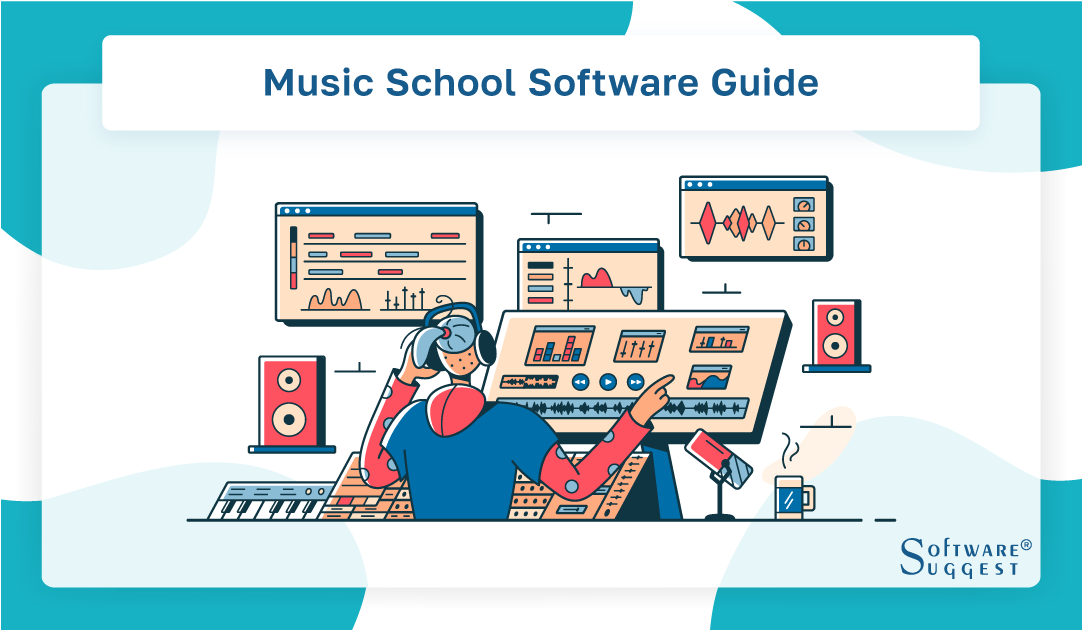
Technology has significantly changed music education since it first emerged. Music schools and academies have adopted specialized software, revolutionizing the educational process. These computer systems help in managing student data and planning lessons. Also, it helps in events, streamlines teacher-parent communication, and provides internet resources. This article will discuss the best music school software that may benefit music teachers and students by boosting learning. Let's explore the area of technologically enhanced music teaching and see how these software tools can transform the discipline.
What Is Music School Software?
Music school software improves and streamlines the operations of music schools and academies. The main goal of music lessons software is to enhance everyone's learning experience, including students and music teachers.
Music school software is useful for daily tasks like registering student, planning management of courses and lessons, and keeping track of teachers' availability.
These computer tools also help handle several areas of music education, such as attendance monitoring, grading, and activities, and streamlining parent-teacher communication.
Benefits Of Music School Software
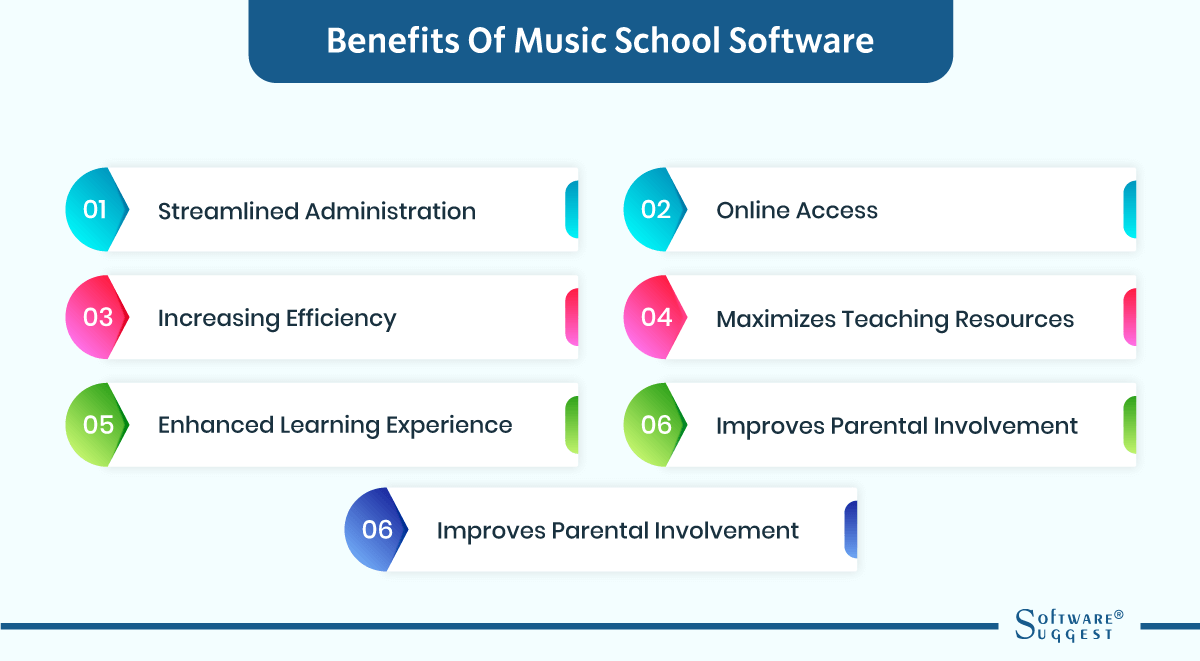
The use of a music studio management system by music educators is crucial for streamlining processes, increasing productivity, and improving student learning. Here, we'll go into further depth about the advantages of music lesson scheduling software.
-
Streamlined administration
Music software for schools simplifies administrative chores like enrolling students, monitoring attendance, grading, and planning classes and events. Teachers can access and update student information using a centralized database, which removes manual data entry and paperwork requirements. This function reduces time spent, increases accuracy, and provides all necessary information.
-
Online access
Students can more easily access course materials and practice tools from anywhere, thanks to music school software that gives online access to resources. Students who cannot attend in-person classes due to geographical restrictions or other factors would particularly benefit from this feature. Students can review course material anytime with online access, enhancing their learning.
-
Increasing efficiency
The use of music lesson software can significantly improve the effectiveness of music academies and schools. Thanks to features like automated scheduling and reminder reminders, teachers may focus more on classroom instruction and less on administrative work. Software tools can also help optimize instructional resource use, lowering the demand for extra personnel and resources.
-
Maximizes teaching resources
Using tools to organize and monitor student progress, music school software lets teachers maximize their available resources. With the help of these tools, teachers may pinpoint the areas in which their charges want further assistance and offer focused criticism to help them develop their abilities. Online tools can also support in-person instruction and give students more practice opportunities.
-
Enhanced learning experience
Music school software improves students' learning by creating a more engaging and interactive atmosphere. Students can study music theory and practice quickly with the help of interactive tools and online resources. Software tools give students a platform to collaborate and exchange experiences with one another, which can enhance the learning process overall.
-
Improves parental involvement
Music school software allows teachers to interact with parents about their child's progress and enhances parental involvement. To better support their children, parents can get alerts about future tests, assignments, and other significant events. Software applications can additionally give parents internet access to course materials so they can help their children's learning outside of the classroom.
-
Improves accountability
Software for music schools that tracks student development transparently enhances accountability. Teachers can pinpoint areas where pupils need more attention and take corrective action using precise attendance records and progress reports. To ensure everyone knows their duties, software systems can also automatically notify students and parents of future assignments and examinations.
Features Of Music School Software

Software for music schools provides a lot of support that may enhance administrative procedures and the learning environment for students and teachers. Here, we will review the key elements of music business management software and how they could benefit music educators.
-
Class scheduling
The ability of music class scheduling software to schedule classes is one of its most crucial functions. With class scheduling tool, teachers may easily build and maintain booking system for music schools.
It is for all classes and events, ensuring that students attend the appropriate classes at the appropriate times. Also, the class scheduling function enables teachers to quickly alter schedules as and when necessary. For example, postponing a session due to a holiday or other unanticipated circumstances.
-
Student management
Student management is critical to music business management software. Teachers may quickly build and maintain student profiles using this tool, which includes the student's contact information, personal information, and course schedules. With the help of this tool, teachers may keep tabs on students' development and performance, covering their grades, attendance, and homework.
-
Attendance tracking
Software for music schools also has attendance monitoring features, which can assist teachers in keeping track of student's attendance and progress. With the help of this function, teachers can easily keep track of which pupils are routinely attending class and which aren't, enabling them to intervene as necessary. Also, by monitoring attendance, teachers can spot children with a hard time and offer extra support to help them succeed.
-
Resource management
Software for music schools has resource management features that can help teachers in more effective resource management. Teachers may conveniently manage their course materials, such as textbooks, sheet music, and other instructional materials, with the help of this tool. Teachers can also track which resources are used the most and which might need to be updated or replaced with resource management.
-
Flexible memberships
Flexible membership choices are another feature of music school software that can assist music lessons online and academies in drawing in and keeping more students. Students can select from various membership options using this feature, such as individual lessons, group lessons, and online courses. Moreover, flexible membership choices can support music schools and academies in providing more individualized educational experiences tailored to each student's specific requirements and interests.
-
Faculty and staff management
Music business management software include faculty and staff management features, which can help music lessons online and academies effectively manage their workforce. Administrators may easily manage employee data using this tool, including contact information, work schedules, and performance reviews. Furthermore, faculty and staff management can assist music schools and academies in tracking their personnel demands and allocating resources more efficiently.
-
Communication management
Effective communication is crucial for music schools and academies, and music school software contains several communication management capabilities to assist with this. With the help of this function, instructors and administrators can interact via email, SMS, and social media with one another, parents, and kids. Communication management technologies can also keep everyone in the know by informing music schools and academies of important news and announcements.
-
Payment processing
Online payment processing features in music school software can help music educational institutions and academies in more effective financial management. Students can use online payments to pay for their classes and courses online, lessening the administrative work involved in manually processing online payments. Payment processing can also assist music academies and schools in tracking their financial performance and producing data on earnings and outlay.
-
Parent and student portal
Parent and student portals are another feature of music school software that can help music educational institutions and academies increase family involvement and engagement. Parents and students can use this tool to access various materials, such as class schedules, course materials, and progress reports.
Parent and student portals can also assist music studio and academies in enhancing communication with parents and students and give them the resources they require to support their children's studies at home.
-
Reporting
Finally, reporting features in music school software enable music studios and academies to create various reports to monitor student achievement, financial success, and other crucial indicators. Administrators may generate reports on student attendance, grades, and assignments using this tool. They can also generate reports on financial performance, including revenue and expenditures. Moreover, reporting can assist music academies and schools find patterns and areas for development and make data-driven decisions to enhance operations and results.
Who Uses Music School Software?
Music school software is a valuable tool for various users, from music learners and teachers to alumni and support personnel. Who utilizes music school software, and how does it help them? Let's take a closer look.
-
Alumni
Alumni who want to stay in touch with their alma mater and stay abreast of events can benefit from music school software. Alumni can stay informed and connected with their previous institution and fellow alumni thanks to alumni portals and social media connections.
-
Instructors
With the help of music school software, instructors can schedule classes, manage their students, and communicate with students and parents. Instructors can benefit from the program by streamlining administrative work, making the most of their available teaching materials, and improving student learning.
-
Parents
In addition to students, parents rely on music school software to keep them updated on their child's performance and progress. The software gives parents quick access to their child's schedule, grades, attendance, online booking, and other crucial data. It also offers methods for connecting with teachers and other parents as well as other parents.
-
Performing musicians
Professional musicians use music school software to manage their calendars, book gigs, and correspond with other musicians and business professionals is also beneficial. Professional musicians can focus more on their creative work by streamlining their administrative responsibilities with the program's help.
-
Music publisher
Music publishers can also use software designed for music studio to manage their libraries, keep track of royalties, and contact artists and labels. Publishers can benefit from the software by maximizing their revenue sources and ensuring their music is legally licensed and distributed.
-
Support staff
Support staff members like administrative assistants and IT specialists may also use music school software to handle their daily work and ensure that the school's operations operate correctly. Support workers can communicate with other staff members and expedite administrative tasks with the program's help.
-
Music students
Last but not least, music students are among the most significant users of music school software. They depend on it to manage their schedules, access educational resources, and communicate with peers and instructors. The program can assist students in remaining organized, online booking, monitoring their development, and making the most of their educational experience.
Key Considerations While Purchasing Music School Software
Given the variety of options on the market today, selecting the best music school software can be challenging. There are several significant factors to remember when choosing the finest cloud based client management option for your music academy or school.
-
Compatibility
One of the most significant considerations when selecting music school software is compatibility. Ensure the program you select is appropriate for your hardware and operating system. This will make it more likely that you will only encounter compatibility or technical concerns.
-
Features
The variety of functions offered is a crucial factor when choosing music school software. Search for software with all the required capabilities, from class scheduling and student administration to resource management and reporting, to run your music school efficiently. Create a list of the essential characteristics you require, then evaluate the feature sets offered by various software solutions to determine which ones are the most complete.
-
Cost
Another essential aspect to think about while selecting music school software is the cost. Search for software that offers all the required functionality and is within your budget. Certain software solutions can charge extra for integrations, upgrades, or support.
-
Ease of use
Another crucial factor is usability. Seek software with a clear, user-friendly, straightforward design. Instead of complicating administrative processes, the software should be made to simplify them.
-
Utilize trial periods or demos
Benefit from trial periods or demos provided by music school software manufacturers before making a final choice. Before committing, you can test the software to see if it satisfies your needs.
-
Integrations
Another essential aspect to think about while choosing music school software is integrations. Look for software that can integrate your existing resources, such as learning management systems, online booking, email marketing platforms, or accounting programs. Your workflows will become more efficient, and you won't have to enter the same information twice.
-
Multiple disciplines
Be sure the software you select is adaptable enough to meet all of your demands if your music school offers lessons in various instruments, such as piano, voice, and guitar. Search for software that can accommodate various lesson formats and scheduling needs.
-
Support & security
Lastly, confirm that the music school software you select includes sufficient support and security precautions. Search for software providers who provide continuing assistance, such as technical support, educational materials, and timely program upgrades. Be sure the software you select also has the proper security features, like data encryption and user access limits.
Top 5 Music School Software
The demand for efficient software to manage operations is rising as music educational institutions' popularity soar. The top 5 music school software applications are listed below:
1. Jackrabbit music
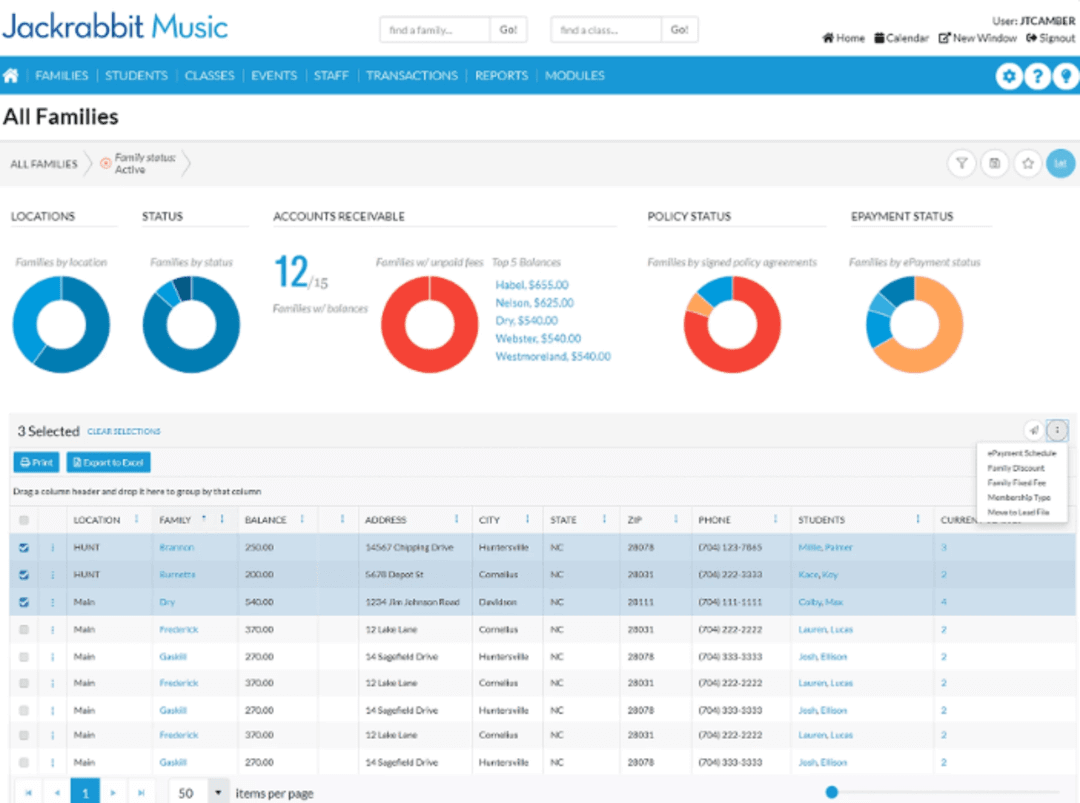
Jackrabbit Music is a cloud-based class administration tool. It assists the music studio in managing online registrations, keeping track of attendance, and processing payments on a single platform.
Key features
- It allows instructors to see daily, weekly, or monthly lessons using built-in calendars
- It connects with QuickBooks
- It enables businesses to automate a range of accounting tasks
Pros
- Sizeable pricing
- Huge library of options
- Prompt on call assistance
- Online booking
Cons
- Complex billing procedure
- Private classes are not offered
Pricing
- Pricing starts at $49 per month
2. ProClass
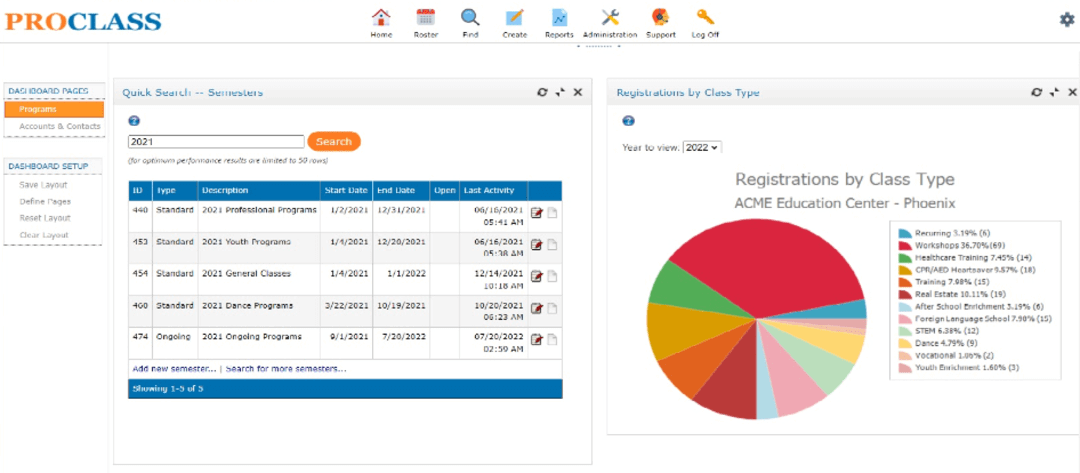
ProClass, is a cloud-based registration solution. Online registration, membership administration, and money collection are made easier with the help of this software. It is appropriate for creating educational initiatives and educating corporate alliances within charities and charitable foundations.
Key features
- Class management
- Event management
- Attendance tracking
- Batch payment processing
Pros
- Customer Service
- Personalized webinars
- Flexible usability
Cons
-
Complex backend experience
Pricing
- Pricing is based on an individual quote
3. Sawyer
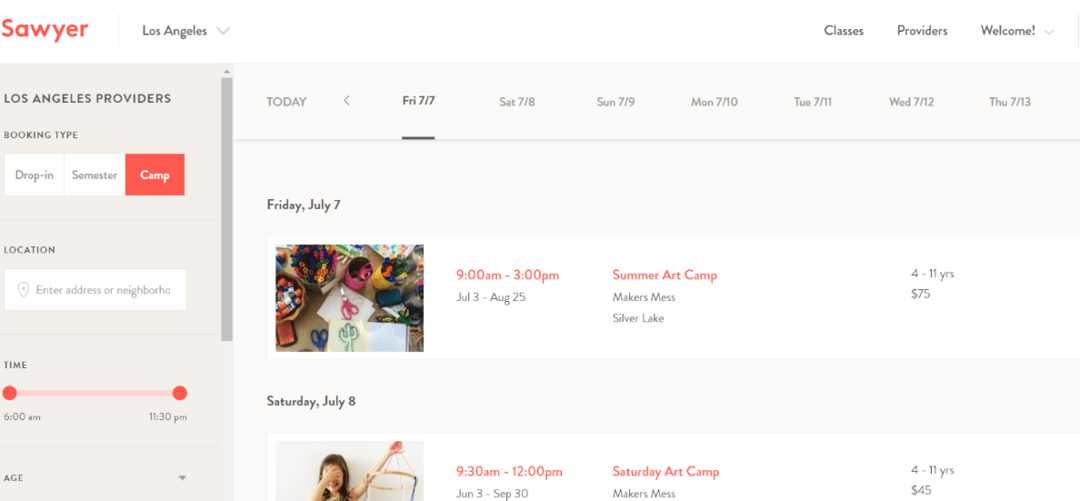
Sawyer, a cloud-based camp and activity management system. Kids' camps, after-school programs, and other events can be scheduled and booked using it. Additionally, the solution offers a website where parents can register their children for summer camps and semester-long courses.
Key features
- Online registration
- Online payment gateway
- Parent portal
- Student management
Pros
- Simple online registration process
- All features under one dashboard
- Customized Service Creation
Cons
- Tools can be hard to use
- Inefficient auditing
Pricing
- Pricing starts at $109 per month
4. Fons
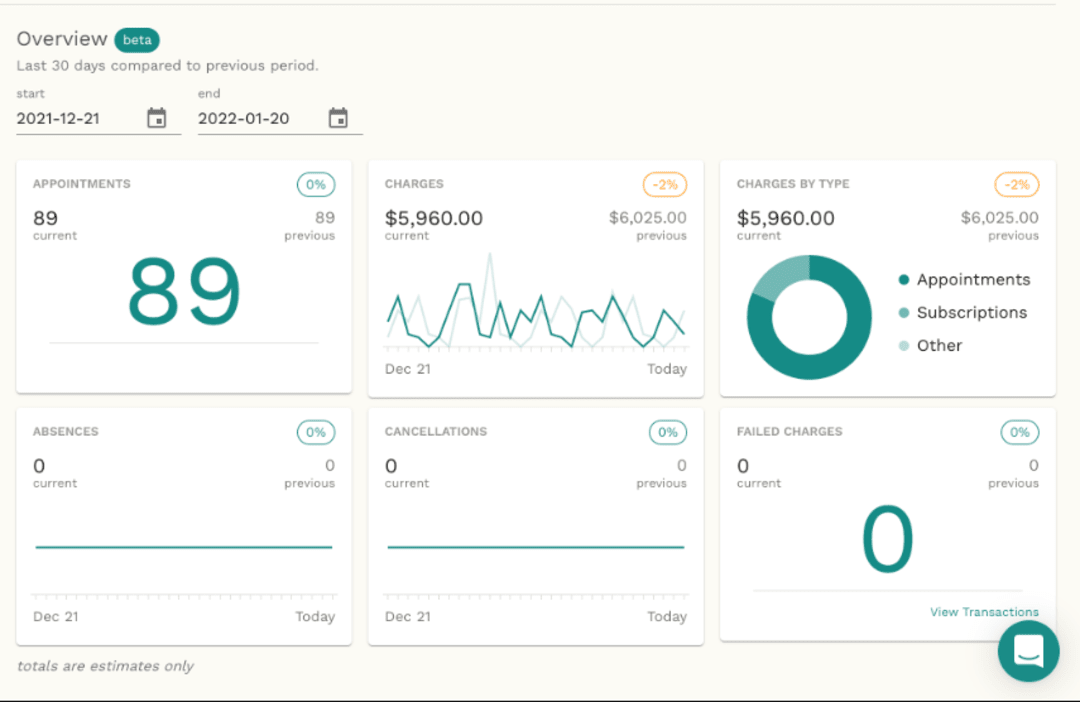
Fons is an online platform that makes scheduling, billing, and payments easier for business owners, freelancers, and other professionals. Users of Fons may quickly make calendars, schedule appointments, and collect payments all in one location.
Key features
- Online scheduling
- Automatic reminders
- Client management
- Easy Invoicing and payments generation
Pros
- Easy to use
- Personalised usage
- Saves time
Cons
- Limited integrations
- Inefficient customer support
Pricing
- Pricing starts at $29.95 per month
5. Jumbula
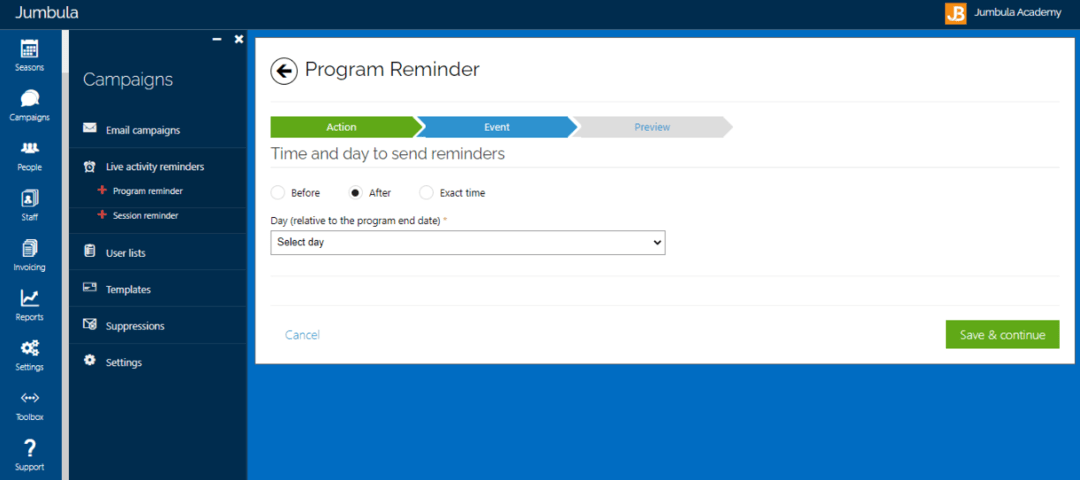
Jumbula is an online registration system created for after-school activities, camps, classes, and events. It offers online payments, online registration forms, user engagement through online marketing tools, and more.
Jumbula allows customers to manage registrations whenever, anywhere, and on any internet-enabled device. This is because it is a cloud-based solution.
Key features
- Online registration
- Various payment options
- Online booking
- Marketing and communications tools
- Easy admin dashboards
Pros
- Added features while registering
- Can copy for the earlier sessions to create a new one
Cons
-
No bulk editing option
Pricing
- Pricing starts at $50 plus processing fees
Music School Software Market Trends To Understand
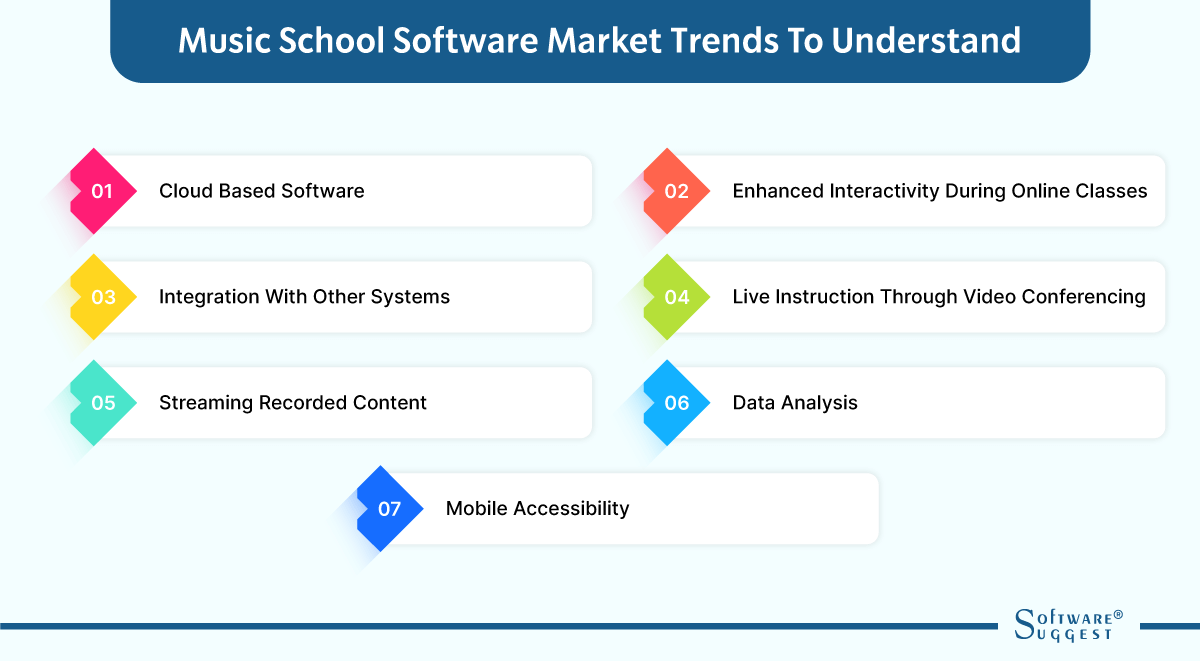
Technology has completely transformed practically every aspect of life, including education. The field of music education is not an exception. The introduction of music school software has revolutionized how those institutions run. The program has improved the effectiveness and efficiency of teaching and learning. To stay competitive, music schools must keep up with the newest industry developments linked to music school software. Several of the market trends that music schools should be aware of are covered in this section.
-
Cloud-based software
Music schools are increasingly embracing cloud-based technologies. Unlike conventional on-premises software, cloud-based software enables music schools to store and access data and information via the internet.
Software that is hosted in the cloud is more adaptable, scalable, and economical than software that is installed on-site. The program is available to music schools from any internet-connected device, making it simple for students, professors, and administrators to communicate and exchange knowledge. Also, since data is centralized and backups are performed automatically, cloud-based software is more secure tahn on-premises.
-
Enhanced interactivity during online classes
The Covid-19 epidemic has led to the adoption of online courses by numerous music schools. However, online classes can be less engaging and involved than traditional classes. Software vendors for music schools are creating programs that improve interaction in online classes in order to solve this problem. The program offers resources that promote student involvement and participation, such as virtual whiteboards, interactive tests, and breakout spaces. The software may also track students' progress and offer feedback, personalizing the educational experience.
-
Integration with other systems
Software for music schools can be connected with various platforms, including financial, student information, and learning management systems. Efficiency is increased, and human data entry is decreased by integration with other systems. For example, connectivity with student information systems can automatically manage update student records and grades, while integration with accounting systems can create invoices and track payments automatically.
-
Live instruction through video conferencing
Via video conferencing, live instruction can be made possible through music school software. This function enables music schools to reach a larger audience by enabling remote instruction.
Also, live training via video conferencing enables two-way communication and real-time feedback between the instructor and the learner. To improve the live instruction experience, music school software suppliers are creating software that connects with well-known video conferencing platforms like Zoom and Skype.
-
Streaming recorded content
Software can also be used by music schools to stream recorded content. Students who missed a class might use recorded material as a substitute or refresher material. Music schools can also profit from recorded content by selling it to students who are not current students. Providers of software for music schools are creating programs that make content streaming and recording simple.
-
Data analysis
Software for music schools can gather and analyze information on pupil performance, teacher efficacy, and other important parameters. Analyzing data yields information that can be applied to enhance the process of instruction and learning.
For instance, data analysis can assist in pinpointing problem areas for kids so that appropriate interventions can be made. Also, data analysis can assist music schools in making wise choices regarding the distribution of resources and the development of their programs.
-
Mobile accessibility
In the educational field, mobile accessibility is becoming increasingly crucial. Software for music schools is being created by companies designed for mobile devices like smartphones and tablets. The program is more convenient and adaptable because it can be accessed from anywhere and at any time, thanks to mobile accessibility for students, teachers, and administrators. A wider audience may be reached by music schools thanks to mobile accessibility, including students who might not have availability to a desktop or laptop computer.
With What Other Software Music School Software Integrates?
Software for music schools can be connected with various programs to increase efficiency and improve functionality. Student information systems integration is one of the most crucial (SIS). The automatic updating of student records and grades made possible by SIS integration makes it simpler for teachers to monitor student progress. It also guarantees that student data is accurate and current, minimizing mistakes and duplication.
The integration of learning management systems is also crucial (LMS). Music schools can provide online courses and evaluations, monitor student progress, and manage course materials thanks to integration with LMS. The integration makes a single platform for administering all learning activities available, making it simpler for teachers to produce and distribute interesting content and for students to access it and engage with it.
Pricing for Music School Software
Software for music school is priced differently based on its features and functionality. Most software vendors for music schools offer subscription-based pricing, in which schools pay a monthly or yearly price to use the program. Pricing typically varies according to the number of users, number of pupils, and level of functionality needed.
Some software vendors for music schools provide a free trial period so that schools can evaluate the program before committing to a subscription. Others provide a freemium approach, wherein entry-level functions are provided without charge, but premium features demand money.
Conclusion
Both music teachers and their pupils can benefit greatly from music school software. It can give children a chance to explore, study, and flourish in the musical arts while also assisting teachers in better evaluating and enhancing their pupils' progress.
Teachers may design thorough and interesting curricula that give all students the knowledge and abilities they need to be excellent musicians using the correct methodology and music school software.
In order to develop remarkable and cutting-edge educational experiences, instructors can work with other music professionals using music school software. In the end, music school software offers a platform that may be utilized to encourage, instruct, and empower present and upcoming generations of music lovers. You can make sure that the music industry keeps developing and growing. Hence, you can avail the benefit of such software as far as music is concerned





.png)





